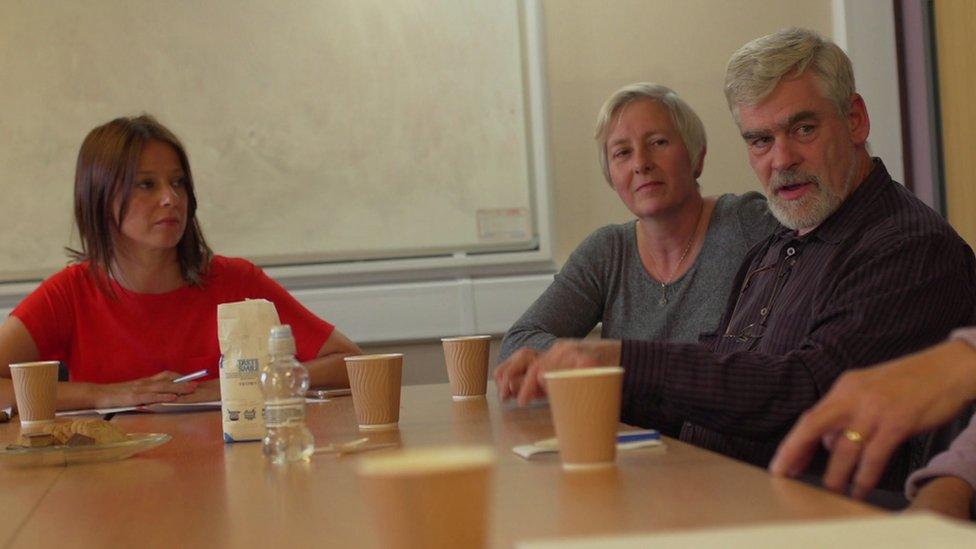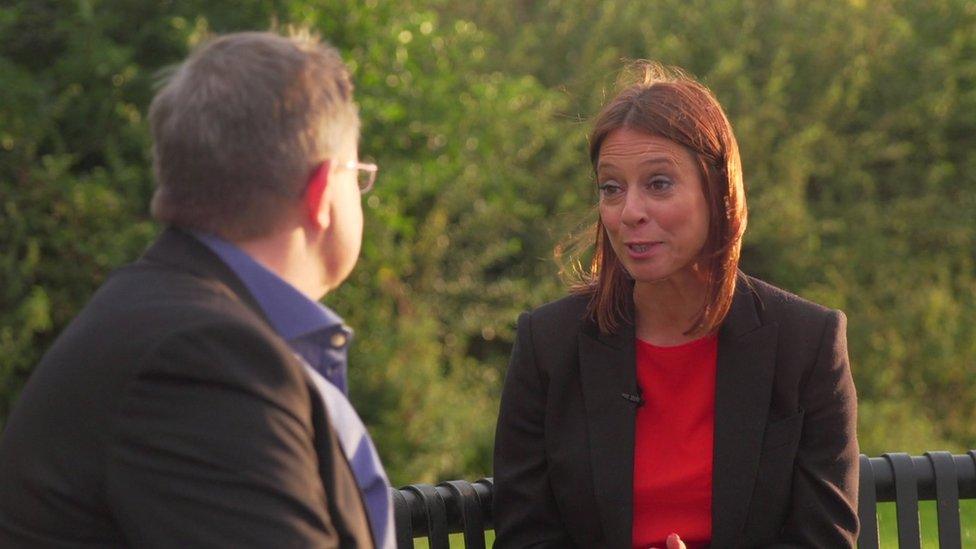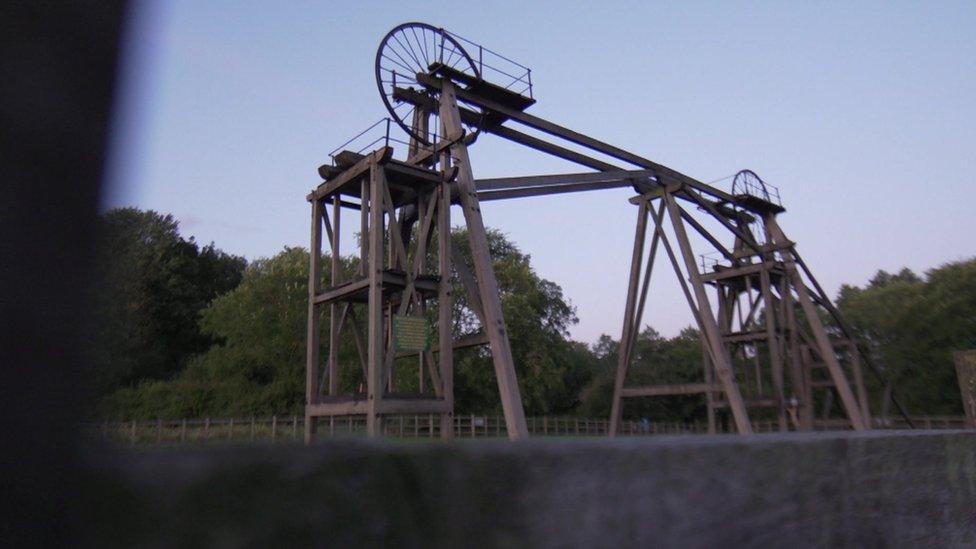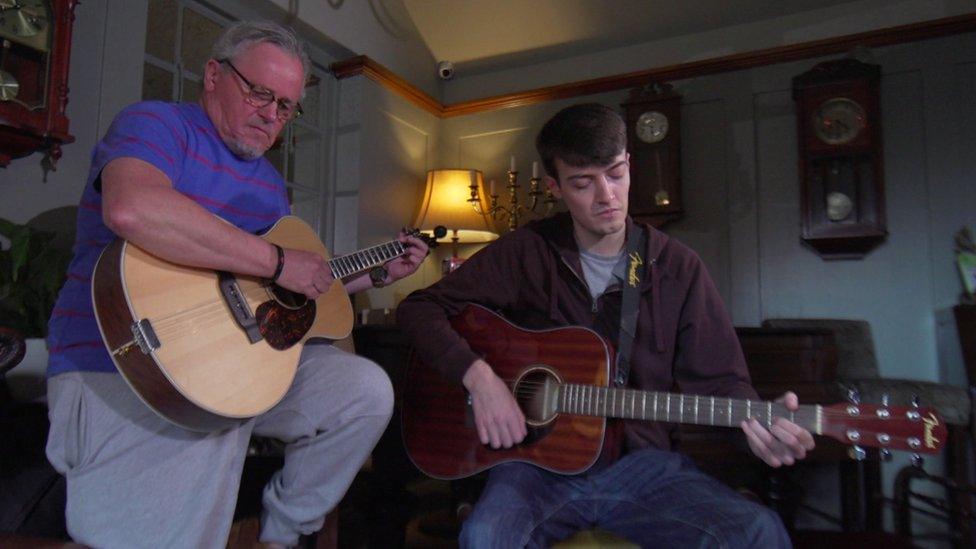Brexit: Labour's hunt for 'reconciliation' in crucial seats
- Published

These young activists say they want Labour to "become the party of Remain" - but it's not that simple
Ashfield in Nottinghamshire has been Labour-held for all but two years since the seat's creation in the mid-1950s.
Since then, though, the mining industry has gone, and with it, Labour's large majorities.
The current MP, Gloria De Piero - who is standing down at the next election - has an emaciated majority of 441 votes.
At the 2016 referendum, nearly seven out of 10 voters backed Brexit, but despite the overwhelming enthusiasm for leaving the EU, divisions here - as at Westminster - still run deep.
Ms De Piero was an ardent Remainer, but now believes the best way to heal divisions is to leave with a deal.
She brought vociferous Leavers and Remainers together at a local community centre for a "reconciliation" meeting.
Security, in the form of a party member who used to be a policeman in Glasgow, wasn't required.
But views weren't exactly reconciled either.

Gloria de Piero talks Brexit with Ashfield Leave supporters
One Conservative voter observed that her grandparents had fought in the war for the nation's independence - and yet politicians couldn't deliver it in peacetime.
But more worrying for the local MP were the views of Jane Gilbert - a care worker who had backed Labour for decades but was thinking of voting for The Brexit Party.
She resented being told that she didn't know what she had voted for in 2016, and she felt Labour had been fence-sitting for three years.
"I feel betrayed and disappointed. I have lost trust with that party," she said.
With an impending election, Gloria de Piero is worried her party could now lose her seat.
She said: "There is no route to Downing Street that doesn't run through seats like Ashfield.
"We shouldn't ignore Remain voters, but this is a big Leave area and we abandon our heartlands at our peril."

Labour has in essence half a Brexit policy as an election looms.
It agreed to call for a referendum to oppose no deal or "a bad Tory deal" - with Labour backing Remain under these circumstances.
The mere talk of another referendum hasn't gone down well with some of Ashfield's Leave voters.
But now the focus is on what a Labour government would do.
Following poor results in the European elections - and the phoenix-like rise of the Lib Dems, senior party figures have been urging Jeremy Corbyn to offer a new referendum and to campaign to Remain under all circumstances.
In other words, even if a Labour government negotiates a "soft Brexit" and puts this to a vote, they want Labour to become an avowedly Remain party which would officially argue to stay in the EU.
Jeremy Corbyn will meet the leaders of the big Labour backing unions behind closed doors at the TUC today.
The Unite union in particular wants him to rebuff the "remain under all circumstances" approach and he is expected to do so.

In 2016, nearly seven out of 10 voters in Ashfield backed Brexit
But the issue splits Labour members even in Leave-voting Ashfield.
I met some of them at the Dandy Cock pub in Kirkby.
Martin Carey - who describes his voice as a cross between Tom Waits and Rowlf the dog - leads a folk group and treated me to one of his own songs about the area's industrial past.
But he was very much focused on the future.
"We must become the party of Remain," he said, arguing that was the best way of seeing off a Lib Dem threat nationally.
Interestingly, guitarist James Avison, who voted to Leave, said he wouldn't be too fussed if the party became more Remain. At a general election he was more concerned about policies on health and education and would be staying loyal to Labour.
His colleague, Chris Varnham, was also a Leave voter. While he was having second thoughts, he wasn't keen on Labour advocating another referendum. He said bluntly it would be a "kick in the teeth" to heartland voters.

In nearby Nottingham, at a community art gallery part funded by the EU, I met young activists from the campaign group Another Europe Is Possible
They had all campaigned to make Jeremy Corbyn Labour leader.
Their view is in short "tough on Brexit, tough on the causes of Brexit".
They advocate anti-austerity policies to target those who felt left behind at the referendum.
But aspiring Labour candidate Nadia Whittome was another who told me "Labour must unequivocally become the party of Remain."
Her group - and others - have submitted motions to this year's Labour conference which, if passed, would end any ambiguity in policy and make Labour a Remain party and one which argues more strongly for issues such as freedom of movement.
Nadia's colleague Marko Dimac - the group's regional organiser - is from Slovenia and says these are the policies "to make Labour a 21st Century party".
Local councillor AJ Matsiko, however, is content for Labour to negotiate a Brexit deal just so long as voters are also given the option to Remain in a subsequent referendum.
Wider policies
Back in Ashfield, I caught up with Gail Whibblin, who runs a thriving dog-walking business but is worried that Labour isn't giving a clear lead on Brexit.
She is proof that it isn't just some Leave voters who are considering abandoning the party.
Her father was a Labour candidate and she herself had supported Jeremy Corbyn.
But she is now considering voting Lib Dem because they are clear where they stand and "the other two parties haven't got their act together."
Labour hopes its wider policies will boost support when an election comes
But having attracted both Leave and Remain voters in 2017 their dilemma is that any clearer definition of their policy will come with the consequence of pushing some voters away - but continued ambiguity will be ridiculed by opponents.